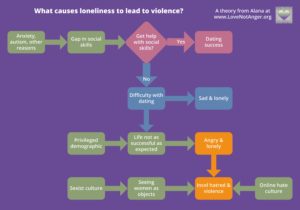This post applies if you are in an equal relationship with a single person, who could safely talk to you about their personal life. Use a different strategy if you are the single person’s parent or family member, or if you are their boss, teacher, religious leader or other authority figure.
So you’ve noticed that your friend hasn’t been dating anyone in years. Maybe they have never dated anyone.
Some possibilities
Maybe they don’t talk about having girlfriends or boyfriends or sex. You have respectfully left that topic alone, or maybe you assumed that your friend will never date anyone. But now you’re worried that your friend is sad or angry, and you wish you could help them find happiness.
Maybe you’ve asked your friend who they are seeing, suggested they bring a date to an event, bugged them about still being single… and they always have an excuse, or look sheepish. Pressuring them more isn’t going to help – they already know that society wants them to partner up.
Your friend may be single for many different reasons. Maybe they prefer to stay single. Maybe they are quietly gay and just didn’t think you wanted to know about their dating life. Maybe dating is a big struggle for them, and they don’t know how to talk about it.
Before the conversation
People with dating difficulties often have low self-confidence and feel unattractive. So it’s important that you not reinforce that with any disapproval or disgust. Even if you don’t find your friend attractive, they need to hear that other people are attracted to confident folks of all body types and personalities.
Your friend might reveal an uncommon romantic or sexual preference. Can you provide the acceptance that your friend needs? If you have judgments or opinions about who your friend should date, don’t get into this conversation.
Opening the conversation
If you and your friend are not in the habit of sharing your feelings with each other, start slow. Offer your own vulnerability first, by sharing something you find emotionally difficult; your friend might be a good listener. Your revelation might prompt them to share something of their own, which might be about dating – or might be another more pressing concern for them. Try to listen without judging them or solving the problem; ask them questions to help them figure out their own course of action.
Once you have some emotional conversation going, you can bring up the dating issue by stating whatever you have observed, and offering to listen. “I’ve noticed that you never mention dating anyone. Are you OK with being single, or is there something you’d like to talk about?” Or, “I hear you talk about people you’re interested in dating, but it never seems to work out. Do you want to talk about that?”
If your friend doesn’t want to talk about it, you have still done something important: you have shown you care. You may have prompted them to think about issues they have been ignoring, or to go and talk to someone else about dating. Let your friend know you are open to listening some time in future, and go back to hanging out with them in your regular friendly way.
If your friend does start telling you about their dating concerns, they may need to hear that not everyone starts dating or having sex in high school. Refer them to Zawn Villines’ article Yes, It’s Okay If You Are Still A Virgin for the reality of how many young people have had sex, and our article About sexual inexperience and virginity.
You can help your friend explore the many possible reasons why they might have difficulty with dating. Some people just need a little boost from a friend while others need counselling to work through big difficulties. Most single people need to make some changes in their life to be open and ready for dating.
If your buddy is interested in dating now, you could improve their self-confidence by saying or demonstrating why they are an awesome person. Discuss some ways to make conversation with potential partners. You could help them get started with online dating, and bring them to events where they might meet people. If they want to move to find more partners, here are some considerations. As they start dating and inevitably get rejected, you might need to talk them through some disappointments, and remind them not to obsess about any one potential mate.
If your friend is not ready for dating yet, you could talk about how their single life could be happier. You could help them find classes, teams or groups that share their interests. You can invite your friend to go for walks or workouts, without saying judgmental things about their weight or fitness. Encourage them to see their doctor about any physical or mental health troubles, including anxiety, depression or addiction. If their emotional struggles are deeper than you know how to respond to, help them find a therapist. If your friend has difficulty with social skills, suggest that they ask their doctor or therapist about autism and how to learn better communication skills.
Has your friend gotten angry about dating? Have they decided that all men are assholes because a few men mistreated them? Or they hate all women because they’ve been rejected too many times? This sort of anger is not attractive, and your friend will need to work through it before they can start healthy relationships. Listen to your friend’s story, and see if they feel more positive about people in a few weeks. If they keep repeating an angry refrain, your friend may need to see a therapist to start singing a different tune. Meanwhile, keep demonstrating that you respect every man and woman as an individual. If your friend says unfair or untrue things about people, push back and help them see reality.
Setting boundaries
Now that you are available to hear your friend’s feelings, they might have a LOT of feelings to share. They may have a complicated life story to tell, or a big dilemma to work out, and suddenly they have someone who will listen. You may need to set boundaries on how you will chat about their dating issues. You are not obliged to listen to them every day, or listen for hours on end, or listen to things that upset you. Encourage your friend to talk to multiple friends, and a therapist, and to express more of their feelings by writing a journal or some other creative activity.
Also be prepared for the possibility that your friend has a crush on you, or that the emotional conversation might create romantic interest. If you’re available and interested, great! Just expect some awkward conversations at first.
If you’re not available or interested, you will need to set boundaries. Be prepared to tell your friend, in clear words not vague hints, what you do and don’t want included in your friendship. Remind your friend that they will find other, more suitable partners, with whom they could gradually develop trusting relationships. Understand that your friend might feel awkward about their crush, or your rejection of it, and they might disappear for a while. Let them know if you would welcome them back into your life.







Pingback: My adult child is still single, what do I do?! – Love Not Anger
Pingback: Concerned about a single person? – Love Not Anger